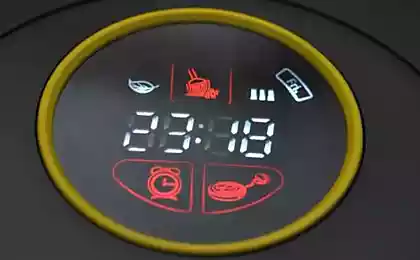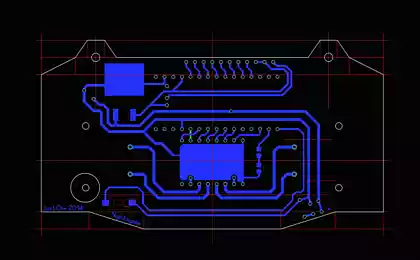560
How to make a day job for 90 minutes
A typical office worker in the US really only works 90 minutes a day. (I think that in Russia and Ukraine, the options are even worse)
The rest of the time is spent on different things like: reading news, web surfing, socializing with coworkers, snacking, coffee breaks, unnecessary shifting of documents, handling e-mail, games and dreams.
Nevertheless, American officials are among the most productive in the world. In many other countries, people spend even less time.

The 90-minute figure has not changed much over the past decades, despite massive investments in time management and training performance. We have excellent technology to help you be productive, but we have even more money to get away from work.
A common problem is that we still use ancient industrial model of performance measurement for knowledge workers. It makes sense to pay attention to hours of operation, if the productivity per hour is about the same. This may be true for repetitive labor, but it certainly does not apply to employees of mental.
For the worker of brainwork, the difference between the most and least productive hour can reach tens of times, from the point of view of volume of work performed and the results obtained.
Then what is the point to hold the office for 8 hours if you usually work only at 20% capacity? Why not just do the job for 90 minutes and then just go back home?
What would happen if you could complete your entire day job in 90 minutes? It would look like this 90 minute period?
The focus blockHere are some guidelines to get a very productive 90-minute period (call it a focus block):
1. Select one theme — Instead of doing a bunch of random, pick one clear theme for the block. This allows you to load your brain with one task and stick to it, making you more efficient. Your topic can be a project you're working on, type of work, such as handling of correspondence, or something that allows your brain to work on one common task and stick to it.
2. Define goals – take a Look at your unit as a way to quickly reach the finish line. But where is the finish line? What she looks like? A clear goal, which is only 90 minutes from you, will help you focus. Don't worry if you don't always manage to cross it: she just helps you focus. So strive for it, but don't worry if I don't achieve it. Here are some examples of the goals for the focus of the unit: to Write and publish a new blog entry. To process e-mails until empty. To schedule all the focus blocks for the upcoming week
3. List the practical steps — List the specific actions you will perform during this block. For some units it is really helpful. For others, it may not be necessary if all steps are so clear. I do not list the steps for writing a new article because this process is very familiar to me, but I would have listed the steps for organizations to brainstorm and list the steps for a new project to make working on it easier. Here are some examples: to Delete all obvious spam and clutter from my mailbox in the first place. Then quickly process all the messages that I can handle less than two minutes each. Then, sort and prioritize a long message to reply. To answer the most important long messages while I'm within the 90-minute focus block. The remaining letters that are not worth wasting time just to back up to clear the Inbox.
4. Ensure that interrupts Do whatever it takes to not be interrupted under any circumstances during your focus block. If necessary, tell people in advance that you will not be available for the next 90 minutes; let them know that you will be available then. Lock the door if you can. If you can not guarantee that you will not be interrupted in its current location, swipe your focus block somewhere else. You'll be much more productive and your focus will be deeper if you know for sure that nothing will disturb you.
5. Work fast think. Quickly move. Quick operate. If you feel that the brake – accelerate! Imagine that you are in a race, and you desperately need to maintain a high pace over the next 90 minutes. Then you can relax. With practice it becomes easier.
6. Do not allow yourself to be distracted During your focus block, you must do only the work planned and nothing more. Turn off your cell phone. Turn off all notifications that might interrupt you. Turn off your Internet access if you do not will need it during this unit. Do not check email during this time. Do not coffee break or a bite to eat.
I think you get the idea.
Avoid Gray areas and make real breaksMany people spend their days at work in a gray zone marathon. That's why they need 7-8 hours to do 90 minutes of work. They work slowly and inefficiently. Their work time is cluttered with distractions and interruptions. They start late and rest early. Most of the time, they work only half.
Instead of continuing this marathon in a gray area every day, divide real work and real breaks. It will be much more effective, even if you only work half of their working time.
Also, do not immediately go from one focus block to another. After you complete a focus block, celebrate your achievements. Then assess where you are. Feel your energy.
If you still feel wound up and tense, you might only need a short break. Take 5-10 minutes to portageville, to go to the toilet or eat fresh fruit. After that, feel free to dive into another focus block.
If you feel tired, well, something to eat or take a NAP.
If you feel the need to warm up – go for a walk and do some exercise.
If you feel the need to escape emotionally, will help the prayer communicate with friends or reading something inspirational.
How large should take breaks? Make them so large as it will need to be ready for the next round of focus blocks. Sometimes you may need only a few minutes. In other cases, it may be a couple of hours, especially if the previous block was particularly difficult. Between focus blocks, seek to refresh and renew your energy until you are ready to take on another unit.
Do your best to not load your breaks tasks from the grey zone. Such as e-mail, as this is likely only to deprive you of energy. I recommend to perform small tasks in their own focus block (including email). But if it really is a very short task, literally one minute, then of course nothing bad will happen if you will do it. Just do not be a short task to carry important or financial Affairs. Just put these things on a separate block.
Understand that if you only completed one focus block in a whole day, you still do as much real work as it makes the typical American employee for the full eight-hour day. If you have completed two blocks you twice the performance than most. Well, super productive day can be considered the day you graduated five or six blocks is actually the result of a working week, resulting in a single day.
Do a week's work in a dayDuring one of the most productive periods in my life when I was doing contract work on game programming, I usually worked from 9 am until noon, with one hour break for lunch and then worked from one o'clock until 5 or 6 PM. I have also divided the work into shorter focus blocks of deep concentration.
At the beginning of each day, I was determined the next stage, which I would like to achieve, for example, a short list of new items to add. Then I made a short list of steps and actions in his work in a special register (in the normal calendar on the spiral). Sometimes I didn't record all the steps when they seemed obvious. Then I just listed everything in order. Finally, I sat down and programmed, tests, bug fixes and adjusted everything until I was completely satisfied. The typical length of time to work I was 45-90 minutes.
As I was developing computer games, the typical test was a little play in it to test the new features, and General gameplay. In essence, the testing phase gave my brain a nice break from designing algorithms and writing code.
When I finished a similar cycle, I had a sense of accomplishment. I took a little break to portageville. After that, I was getting ready for a new cycle, starting with the task list.
In the morning I finished a few of these focus blocks, usually three. In the second half – did a few more. My game projects have progressed very rapidly during this time. Every day I added many new features. I could supramaterial a completely new game in a few days. And with today's more sophisticated development tools, the work can progress even faster.
During lunch each day, I took a break to restore my mental energy. I rarely went to lunch with his colleagues. I usually brought lunch with me, but left the office to eat. I went to a nearby Park to sit on the grass, back against a tree, and eat alone in silence. I let go of all the work and just rested. After eating, I lie down on the grass and slept for 20 minutes, or just stared at the sky. I enjoyed the breeze and listened to the birds singing. I gave the parts of the brain necessary for programming, a bit of quiet rest. After that, I went back to his work, and has spent several cycles, before the day was over.
Test, practice and experimentIf you are not used to the working rhythm of the focus blocks with rest periods, you may need some time to practice and get used to it. I think you will really enjoy this work with continuous flow. Execution of the day's work in 90 minutes not only effective, it also motivates and relieves stress.
Cycles for 90 minutes usually work well once you learn to accelerate. But you may also find that shorter cycles, for 45 or 60 minutes work better for you. You can also discover that various lengths of cycles are more suitable for different types of work. Sometimes I lengthened the cycles to 2.5 hours (or more) if I felt good, especially when writing new articles.
Some people do like the many scheduled focus blocks with breaks throughout the day. They clearly follow the time and take breaks at a set time. There is even some evidence that it helps to optimize the performance of your brain, if you do the cycle every day.
For example, you might plan 5 focus blocks per day: 5.30-7.00, 8.00 – 9.30, 10.30 – 12.00, 13.00 – 14.30, 15.30 – 17.00. This will give you five 90 –minute focus blocks with hour break in between. It would be a super productive day, as only doing real work for 7.5 hours, you could do the same as the ordinary office worker does in a week..
Other people prefer a more organic approach, deciding to take breaks based on their feelings and sensations of its energy levels. By the way, so I work most of the time.
Modest but still highly productive schedule might be the implementation of three focus blocks per day. You can easily complete a lot of work that way. Many top creative workers only work 3-5 hours a day, but they work with deep focus and no distractions during this time.
Do not give in to cultural biases, that work 8+ hours per day makes you productive. This may be true for physical labor and some repetitive tasks, but it is fundamentally not true for knowledge workers and creative types. Plenty of people around who use this strategy and achieves greater results by working in short periods with flashes of high energy, motivation and drive. Try it for yourself and you never can return to the gray zone of long, unproductive workdays.published
P. S. And remember, just changing your mind — together we change the world! ©
Join us in Facebook , Vkontakte, Odnoklassniki
Source: allstevepavlina.ru/do-a-full-days-work-in-90-minutes
The rest of the time is spent on different things like: reading news, web surfing, socializing with coworkers, snacking, coffee breaks, unnecessary shifting of documents, handling e-mail, games and dreams.
Nevertheless, American officials are among the most productive in the world. In many other countries, people spend even less time.

The 90-minute figure has not changed much over the past decades, despite massive investments in time management and training performance. We have excellent technology to help you be productive, but we have even more money to get away from work.
A common problem is that we still use ancient industrial model of performance measurement for knowledge workers. It makes sense to pay attention to hours of operation, if the productivity per hour is about the same. This may be true for repetitive labor, but it certainly does not apply to employees of mental.
For the worker of brainwork, the difference between the most and least productive hour can reach tens of times, from the point of view of volume of work performed and the results obtained.
Then what is the point to hold the office for 8 hours if you usually work only at 20% capacity? Why not just do the job for 90 minutes and then just go back home?
What would happen if you could complete your entire day job in 90 minutes? It would look like this 90 minute period?
The focus blockHere are some guidelines to get a very productive 90-minute period (call it a focus block):
1. Select one theme — Instead of doing a bunch of random, pick one clear theme for the block. This allows you to load your brain with one task and stick to it, making you more efficient. Your topic can be a project you're working on, type of work, such as handling of correspondence, or something that allows your brain to work on one common task and stick to it.
2. Define goals – take a Look at your unit as a way to quickly reach the finish line. But where is the finish line? What she looks like? A clear goal, which is only 90 minutes from you, will help you focus. Don't worry if you don't always manage to cross it: she just helps you focus. So strive for it, but don't worry if I don't achieve it. Here are some examples of the goals for the focus of the unit: to Write and publish a new blog entry. To process e-mails until empty. To schedule all the focus blocks for the upcoming week
3. List the practical steps — List the specific actions you will perform during this block. For some units it is really helpful. For others, it may not be necessary if all steps are so clear. I do not list the steps for writing a new article because this process is very familiar to me, but I would have listed the steps for organizations to brainstorm and list the steps for a new project to make working on it easier. Here are some examples: to Delete all obvious spam and clutter from my mailbox in the first place. Then quickly process all the messages that I can handle less than two minutes each. Then, sort and prioritize a long message to reply. To answer the most important long messages while I'm within the 90-minute focus block. The remaining letters that are not worth wasting time just to back up to clear the Inbox.
4. Ensure that interrupts Do whatever it takes to not be interrupted under any circumstances during your focus block. If necessary, tell people in advance that you will not be available for the next 90 minutes; let them know that you will be available then. Lock the door if you can. If you can not guarantee that you will not be interrupted in its current location, swipe your focus block somewhere else. You'll be much more productive and your focus will be deeper if you know for sure that nothing will disturb you.
5. Work fast think. Quickly move. Quick operate. If you feel that the brake – accelerate! Imagine that you are in a race, and you desperately need to maintain a high pace over the next 90 minutes. Then you can relax. With practice it becomes easier.
6. Do not allow yourself to be distracted During your focus block, you must do only the work planned and nothing more. Turn off your cell phone. Turn off all notifications that might interrupt you. Turn off your Internet access if you do not will need it during this unit. Do not check email during this time. Do not coffee break or a bite to eat.
I think you get the idea.
Avoid Gray areas and make real breaksMany people spend their days at work in a gray zone marathon. That's why they need 7-8 hours to do 90 minutes of work. They work slowly and inefficiently. Their work time is cluttered with distractions and interruptions. They start late and rest early. Most of the time, they work only half.
Instead of continuing this marathon in a gray area every day, divide real work and real breaks. It will be much more effective, even if you only work half of their working time.
Also, do not immediately go from one focus block to another. After you complete a focus block, celebrate your achievements. Then assess where you are. Feel your energy.
If you still feel wound up and tense, you might only need a short break. Take 5-10 minutes to portageville, to go to the toilet or eat fresh fruit. After that, feel free to dive into another focus block.
If you feel tired, well, something to eat or take a NAP.
If you feel the need to warm up – go for a walk and do some exercise.
If you feel the need to escape emotionally, will help the prayer communicate with friends or reading something inspirational.
How large should take breaks? Make them so large as it will need to be ready for the next round of focus blocks. Sometimes you may need only a few minutes. In other cases, it may be a couple of hours, especially if the previous block was particularly difficult. Between focus blocks, seek to refresh and renew your energy until you are ready to take on another unit.
Do your best to not load your breaks tasks from the grey zone. Such as e-mail, as this is likely only to deprive you of energy. I recommend to perform small tasks in their own focus block (including email). But if it really is a very short task, literally one minute, then of course nothing bad will happen if you will do it. Just do not be a short task to carry important or financial Affairs. Just put these things on a separate block.
Understand that if you only completed one focus block in a whole day, you still do as much real work as it makes the typical American employee for the full eight-hour day. If you have completed two blocks you twice the performance than most. Well, super productive day can be considered the day you graduated five or six blocks is actually the result of a working week, resulting in a single day.
Do a week's work in a dayDuring one of the most productive periods in my life when I was doing contract work on game programming, I usually worked from 9 am until noon, with one hour break for lunch and then worked from one o'clock until 5 or 6 PM. I have also divided the work into shorter focus blocks of deep concentration.
At the beginning of each day, I was determined the next stage, which I would like to achieve, for example, a short list of new items to add. Then I made a short list of steps and actions in his work in a special register (in the normal calendar on the spiral). Sometimes I didn't record all the steps when they seemed obvious. Then I just listed everything in order. Finally, I sat down and programmed, tests, bug fixes and adjusted everything until I was completely satisfied. The typical length of time to work I was 45-90 minutes.
As I was developing computer games, the typical test was a little play in it to test the new features, and General gameplay. In essence, the testing phase gave my brain a nice break from designing algorithms and writing code.
When I finished a similar cycle, I had a sense of accomplishment. I took a little break to portageville. After that, I was getting ready for a new cycle, starting with the task list.
In the morning I finished a few of these focus blocks, usually three. In the second half – did a few more. My game projects have progressed very rapidly during this time. Every day I added many new features. I could supramaterial a completely new game in a few days. And with today's more sophisticated development tools, the work can progress even faster.
During lunch each day, I took a break to restore my mental energy. I rarely went to lunch with his colleagues. I usually brought lunch with me, but left the office to eat. I went to a nearby Park to sit on the grass, back against a tree, and eat alone in silence. I let go of all the work and just rested. After eating, I lie down on the grass and slept for 20 minutes, or just stared at the sky. I enjoyed the breeze and listened to the birds singing. I gave the parts of the brain necessary for programming, a bit of quiet rest. After that, I went back to his work, and has spent several cycles, before the day was over.
Test, practice and experimentIf you are not used to the working rhythm of the focus blocks with rest periods, you may need some time to practice and get used to it. I think you will really enjoy this work with continuous flow. Execution of the day's work in 90 minutes not only effective, it also motivates and relieves stress.
Cycles for 90 minutes usually work well once you learn to accelerate. But you may also find that shorter cycles, for 45 or 60 minutes work better for you. You can also discover that various lengths of cycles are more suitable for different types of work. Sometimes I lengthened the cycles to 2.5 hours (or more) if I felt good, especially when writing new articles.
Some people do like the many scheduled focus blocks with breaks throughout the day. They clearly follow the time and take breaks at a set time. There is even some evidence that it helps to optimize the performance of your brain, if you do the cycle every day.
For example, you might plan 5 focus blocks per day: 5.30-7.00, 8.00 – 9.30, 10.30 – 12.00, 13.00 – 14.30, 15.30 – 17.00. This will give you five 90 –minute focus blocks with hour break in between. It would be a super productive day, as only doing real work for 7.5 hours, you could do the same as the ordinary office worker does in a week..
Other people prefer a more organic approach, deciding to take breaks based on their feelings and sensations of its energy levels. By the way, so I work most of the time.
Modest but still highly productive schedule might be the implementation of three focus blocks per day. You can easily complete a lot of work that way. Many top creative workers only work 3-5 hours a day, but they work with deep focus and no distractions during this time.
Do not give in to cultural biases, that work 8+ hours per day makes you productive. This may be true for physical labor and some repetitive tasks, but it is fundamentally not true for knowledge workers and creative types. Plenty of people around who use this strategy and achieves greater results by working in short periods with flashes of high energy, motivation and drive. Try it for yourself and you never can return to the gray zone of long, unproductive workdays.published
P. S. And remember, just changing your mind — together we change the world! ©
Join us in Facebook , Vkontakte, Odnoklassniki
Source: allstevepavlina.ru/do-a-full-days-work-in-90-minutes























